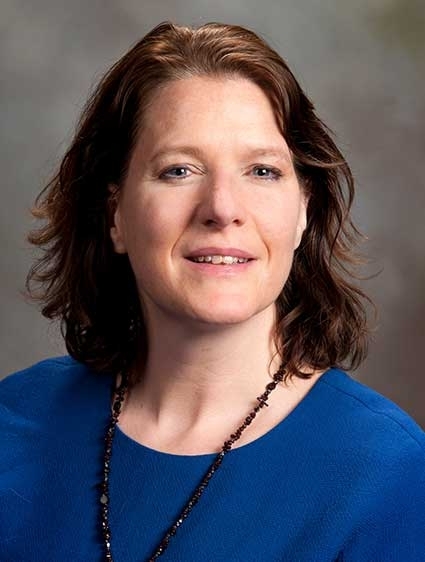Environmental justice activist Dr. Marcy Schnitzer joins Online MNR faculty
February 16, 2021

By Lindsay Key
Who is most affected by policy decisions related to global environmental issues, like climate change? And what about more local issues, like fracking and air and water pollution? Do these important stakeholders have equitable access to the decision-making table?
These are the types of questions that move Dr. Marcy Schnitzer to action. Before joining the Center for Leadership in Global Sustainability (CLiGS) as a faculty member in the Online Master of Natural Resources (OMNR) program this year, she worked for more than 25 years promoting diversity and inclusion in higher education, research, and the nonprofit sector, most recently as Assistant Provost for Diversity and Strategic Planning in the Office for Inclusion and Diversity at Virginia Tech.
In 2010, Schnitzer earned her doctorate in Public and International Affairs from Virginia Tech. Her dissertation research examined energy justice, and specifically focused on the role that coalfield workers have played (or not played) in the Coalfields Delegation to the United Nations Commission for Sustainable Development, as a case study of “actually existing democracy” and the pursuit of energy justice at local, national, and global scales. At the same time, she pursued training through the Virginia Natural Resources Leadership Institute and engaged in facilitation on environmental issues. This community-based focus is at the heart of her commitments to environmental justice.
Teaching the importance of diversity
In 2020, Schnitzer turned her focus to her greatest passion: teaching. During the Spring 2021 semester, she is teaching two courses at CLiGS: Environmental Ethics and Strategies for Sustainability. Having taught at the university level before, she’s really excited to be working with Online MNR students. “The Center was looking for a social science perspective, and that’s really my wheelhouse,” explained Marcy. In Strategies for Sustainability, one of the OMNR core courses, students explore social science theories to explain human behavior, and develop strategies to address sustainability challenges. In Environmental Ethics, an elective course, students learn how to critically examine the ethical dimensions of the embedded social, economic, and cultural constructs that shape both the causes and consequences of environmental problems.
Both courses expose students to social science and ethical theories, asking them to consider the many factors and nuances behind human relationships with the environment and with nature. Often, there is a disconnect between the people who make decisions and the people who will be most directly affected by the decisions, according to Schnitzer. The latter frequently are not represented, and their voices are not heard. This is evident in political decisions made about where to place pipelines, landfills, and contaminated sites. It also comes into play in considerations of access to clean air, water, and healthy food.
Considering diverse perspectives
Schnitzer is determined to help change that by educating environmental professionals in CLiGS programs to consider diverse perspectives. This means incorporating learning materials that reflect the experiences of women, Native Americans, LGBTQ individuals, and African Americans, among many other underrepresented communities.
She hopes her students will come away from the courses with a deeper understanding of and commitment to environmental justice and actions to address the disproportionate impact of environmental harms on people of color and low-income communities, domestically and abroad. “Really, in almost any course that I teach, but especially in these courses, I want to bring home the nature of human beings and their interactions with nature and the environment, and how humans may see nature differently based on their position in society,” explained Schnitzer. One example, said Schnitzer, is how the United States’ unjust history of slavery influences African American perspectives on agricultural farming and nature.
Functioning as an ethical society involves embracing inclusion of different perspectives and voices as a foundation for more just and fair practices when it comes to decision-making, according to Schnitzer. It also involves critically examining institutions and what their communications and behaviors indicate about their values.
Overall, Schnitzer hopes that her classes will help students think more deeply and critically about the diversity of human experiences in the natural environment. In addition to earning a bachelor’s degree in Biology and a master’s degree in Human Resources Management from Virginia Tech, she also regards her time spent volunteering with the Christiansburg Institute as an important type of education. The community-based organization’s mission is to preserve the history of African Americans in the New River Valley, and Schnitzer has volunteered there since 1997.
“That hands-on grassroots perspective has influenced a lot of my path forward, just in terms of thinking where diverse and underrepresented communities are engaged in debates about issues that affect them,” said Marcy. “It informed my research and my interest in how people are able to enter into decision-making, and I then began to look at how that operates at the university level. How are people able to make a difference in the face of power and marginalization? That, of course, binds itself into environmental issues in so many ways.”

Dr. Marcy Schnitzer is a strategic planning, inclusion and diversity, and organizational communications consultant. She has over 25 years' work experience in higher education administration, research, and the nonprofit sector. Over the course of her career, she has built networks and relationships to engage with local communities, particularly with diverse and underrepresented groups.


